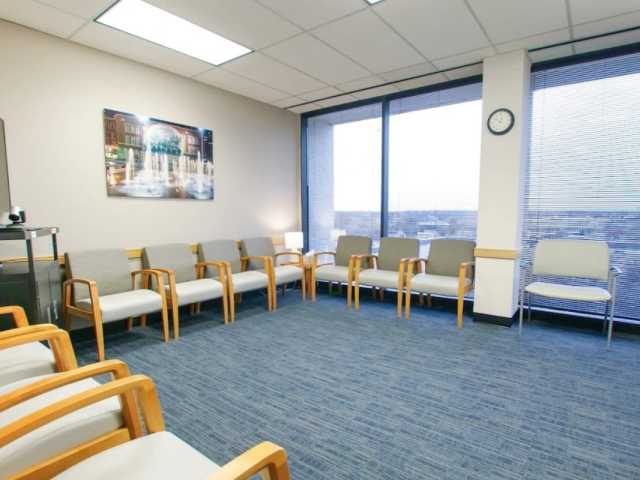






Pathlight Mood & Anxiety Fort Worth
Verified Center
This provider's information has been quality-checked by Recovery.com's Research Team for accuracy and completeness, including center verification through appropriate third-party organizations.
Treatment Focus
This center treats mental health conditions and co-occurring substance use. You receive collaborative, individualized treatment that addresses both issues for whole-person healing.
Primary Level of Care
Outpatient treatment offers flexible therapeutic and medical care without the need to stay overnight in a hospital or inpatient facility. Some centers offer intensive outpatient program (IOP), which falls between inpatient care and traditional outpatient service.
Treatment Focus
This center treats mental health conditions and co-occurring substance use. You receive collaborative, individualized treatment that addresses both issues for whole-person healing.
Primary Level of Care
Outpatient treatment offers flexible therapeutic and medical care without the need to stay overnight in a hospital or inpatient facility. Some centers offer intensive outpatient program (IOP), which falls between inpatient care and traditional outpatient service.
Provider's Policy
We Are In-Network With Most Major Commercial Insurance Providers. To ensure you can pursue recovery, our dedicated team will work on your behalf by acting as a liaison with your insurance provider, answering your questions, and providing guidance and support every step of the way. If your insurance does not cover care at Pathlight, we will work with you and your family to establish self-pay rates. We will do our best to find a financial solution that allows you to get the care you need and deserve.
Pathlight Mood & Anxiety Fort Worth
Pathlight Mood & Anxiety Fort Worth
About Pathlight Mood & Anxiety Fort Worth
Pathlight Mood & Anxiety Center offers a full continuum of care for adolescents ages 12+ and adults with mood, anxiety, and trauma-related disorders. Their treatment options include 7-day-per-week partial hospitalization program (PHP) and 3-day-per-week intensive outpatient program (IOP). Clients and their families are given the necessary tools to achieve lasting behavioral change.
An Internationally Recognized Team
Pathlight Mood & Anxiety Center provides multidisciplinary care under the leadership of internationally recognized experts with a combined 200 years of experience. Their team includes a psychiatrist who sees each client twice a week for medication management within the PHP, a nurse, master’s-level clinicians who conduct group sessions, and a primary therapist. Upon admission, clients are paired with a dedicated primary therapist. This therapist conducts three individual sessions weekly and facilitates additional sessions involving the client's chosen support network.The team uses modalities that include dialectical behavioral therapy (DBT), cognitive behavioral therapy (CBT), as well as incorporating family sessions and group work.
Therapies to Better Regulate Emotions and Responses
Guided by Pathlight's compassionate team, clients grow in their ability to understand their mind and body using both evidence-based therapies and complementary methods like meditation, yoga, and mindfulness. For trauma-related disorders in particular, Pathlight Mood & Anxiety Center uses a form of cognitive behavioral therapy (CBT) called exposure and response prevention and behavioral activation to help relieve the learned avoidance, anxiety, and fear that often develops following a traumatic event. Pathlight also uses acceptance and commitment therapy (ACT) to help clients create a rich and meaningful life while also being able to accept the pain that inevitably comes with life.
Collaboration for Long-Term Recovery
In an effort to support each client’s journey to recovery, the team collaborates with existing outpatient teams to discuss treatment history and goals, and touches base weekly to give progress updates. If a client does not have an existing outpatient team, Pathlight clinicians can make referrals for therapists and psychiatrists. Pathlight’s support for clients and families does not end at the time of discharge–rather, the treatment team carefully develops a personalized discharge plan, and offers several aftercare services and alumni support programs.

Highlights from the Center
Highlights
These highlights are provided by and paid for by the center.
Licensed Medical Facility
Co-Occurring Disorders Treatment
Adolescents
Trauma Treatment
Center Overview
Treatment Focus
This center treats mental health conditions and co-occurring substance use. You receive collaborative, individualized treatment that addresses both issues for whole-person healing.
Joint Commission Accredited
The Joint Commission accreditation is a voluntary, objective process that evaluates and accredits healthcare organizations (like treatment centers) based on performance standards designed to improve quality and safety for patients. To be accredited means the treatment center has been found to meet the Commission's standards for quality and safety in patient care.

Insurance Accepted
Cash Pay Rates
Estimated Cash Pay Rate
Center pricing can vary based on program and length of stay. Contact the center for more information. Recovery.com strives for price transparency so you can make an informed decision.




Levels of Care






Your Care Options
Specializations
Anxiety
Anxiety is a common mental health condition that can include excessive worry, panic attacks, physical tension, and increased blood pressure.
Bipolar
This mental health condition is characterized by extreme mood swings between depression, mania, and remission.
Co-Occurring Disorders
A person with multiple mental health diagnoses, such as addiction and depression, has co-occurring disorders also called dual diagnosis.
Depression
Symptoms of depression may include fatigue, a sense of numbness, and loss of interest in activities. This condition can range from mild to severe.
Obsessive Compulsive Disorder (OCD)
OCD is characterized by intrusive and distressing thoughts that drive repetitive behaviors. This pattern disrupts daily life and relationships.
Post Traumatic Stress Disorder
PTSD is a long-term mental health issue caused by a disturbing event or events. Symptoms include anxiety, dissociation, flashbacks, and intrusive thoughts.
Trauma
Some traumatic events are so disturbing that they cause long-term mental health problems. Those ongoing issues can also be referred to as "trauma."
Who We Treat
Adolescents
Teens receive the treatment they need for mental health disorders and addiction, with the added support of educational and vocational services.
Young Adults
Emerging adults ages 18-25 receive treatment catered to the unique challenges of early adulthood, like college, risky behaviors, and vocational struggles.
Men and Women
Men and women attend treatment for addiction in a co-ed setting, going to therapy groups together to share experiences, struggles, and successes.
Approaches
Evidence-Based
A combination of scientifically rooted therapies and treatments make up evidence-based care, defined by their measured and proven results.
Family Involvement
Providers involve family in the treatment of their loved one through family therapy, visits, or both–because addiction is a family disease.
Individual Treatment
Individual care meets the needs of each patient, using personalized treatment to provide them the most relevant care and greatest chance of success.
Personalized Treatment
The specific needs, histories, and conditions of individual patients receive personalized, highly relevant care throughout their recovery journey.
Therapies
1-on-1 Counseling
Patient and therapist meet 1-on-1 to work through difficult emotions and behavioral challenges in a personal, private setting.
Couples Counseling
Partners work to improve their communication patterns, using advice from their therapist to better their relationship and make healthy changes.
Family Therapy
Family therapy addresses group dynamics within a family system, with a focus on improving communication and interrupting unhealthy relationship patterns.
Interpersonal Therapy
This brief and structured therapy addresses present relationships and improves overall communication at work, home, and other social settings.
Mindfulness-Based Cognitive Therapy
MBCT combines mindfulness practices—like meditation—with cognitive therapy techniques to help patients work through negative thought patterns.
Acceptance and Commitment Therapy (ACT)
This cognitive behavioral therapy teaches patients to accept challenging feelings and make the appropriate changes to reach personal goals.
Conditions We Treat
ADHD, ADD
ADHD is a common mental health condition caused by dopamine imbalance. Common symptoms include inattention, hyperactivitiy, and impulsivity.
Anger
Although anger itself isn't a disorder, it can get out of hand. If this feeling interferes with your relationships and daily functioning, treatment can help.
Anxiety
Anxiety is a common mental health condition that can include excessive worry, panic attacks, physical tension, and increased blood pressure.
Bipolar
This mental health condition is characterized by extreme mood swings between depression, mania, and remission.
Burnout
Burnout entails mental and physical exhaustion, and leads to a severe lack of fulfillment. This condition is often caused by overwork.
Depression
Symptoms of depression may include fatigue, a sense of numbness, and loss of interest in activities. This condition can range from mild to severe.
Obsessive Compulsive Disorder (OCD)
OCD is characterized by intrusive and distressing thoughts that drive repetitive behaviors. This pattern disrupts daily life and relationships.
Post Traumatic Stress Disorder
PTSD is a long-term mental health issue caused by a disturbing event or events. Symptoms include anxiety, dissociation, flashbacks, and intrusive thoughts.
Substances We Treat
Co-Occurring Disorders
A person with multiple mental health diagnoses, such as addiction and depression, has co-occurring disorders also called dual diagnosis.
Languages
Aftercare
Care Designed for Your Needs
Personal Amenities






